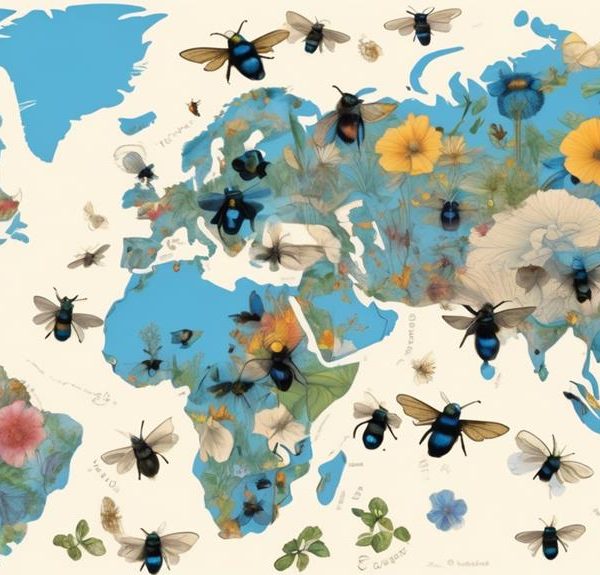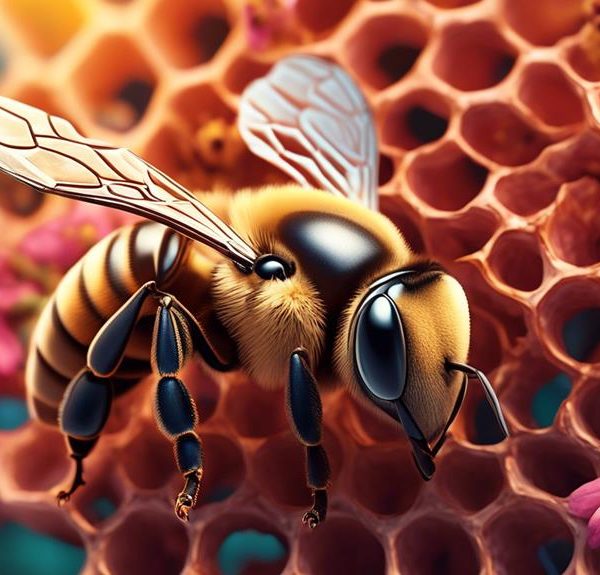Marvel at the complexities and possibilities of urban beekeeping in your subdivision, a venture with unexpected benefits and challenges waiting to be discovered.
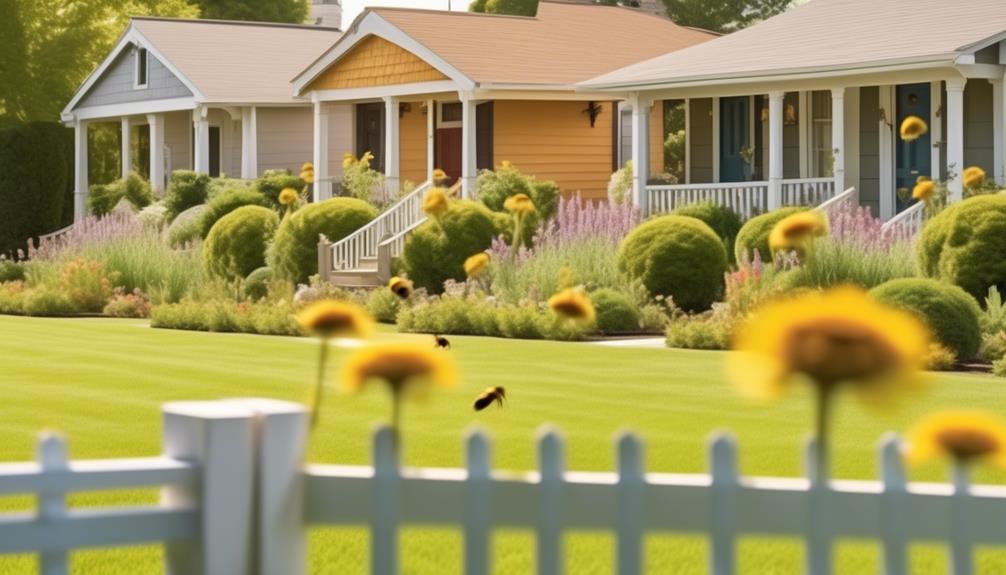
Can You Have Bees in a Subdivision?
Have you ever considered the possibility of keeping bees in your suburban backyard? You're probably wondering whether it's legal, practical, or even beneficial to engage in urban beekeeping.
Well, the reality isn't as straightforward as you might think. There are numerous factors to consider, ranging from local regulations and neighborhood acceptance to the bees' own survival needs.
Yet, the potential rewards, both for you and the environment, might be worth the effort. So, let's explore this intriguing idea further, shall we?
Key Takeaways
- Understanding local regulations is crucial before starting suburban beekeeping, as there may be limitations on hive number, placement, and distance from property lines and public areas.
- Disease management and treatment, as well as monitoring for signs of stress or aggression, are important challenges to consider when keeping bees in a suburban area.
- Suburban beekeeping can have numerous benefits, including enhancing local biodiversity, contributing to pollination and habitat growth, and preserving bee populations and ecosystem stability.
- Starting suburban beekeeping involves researching local regulations, obtaining necessary equipment and bees from reliable sources, and learning about bee health, hive management, and honey harvesting techniques.
Understanding Suburban Beekeeping
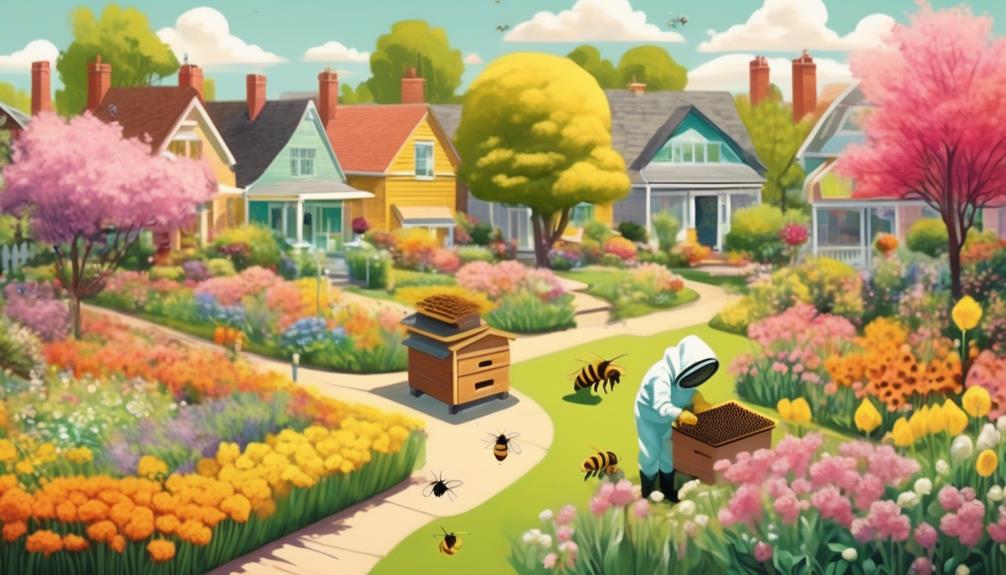
Navigating the ins and outs of suburban beekeeping can be a fascinating journey, requiring a blend of scientific knowledge, practical skills, and a deep understanding of local regulations and hive management.
You'll need to master the biology and behavior of bees, and understand how these factors intersect with the environment of your suburban area. Bees require a steady source of nectar and pollen, and you need to know the flowering plants and trees in your locality.
You'll also have to consider the proximity of your neighbors, as not everyone may be comfortable with a hive nearby. Hive placement is another critical factor; it should be in a quiet area with good sun exposure, protected from extreme weather.
Local regulations differ widely, so you must familiarize yourself with the rules regarding beekeeping in your area. You'll also need to learn how to manage common hive issues like disease, pests, and swarming.
Local Regulations for Beekeeping

While mastering the biology of bees and understanding their needs is crucial, it's equally vital to get a handle on the specific local regulations governing beekeeping in your subdivision. These laws vary widely, depending on the region, subdivision density, and local ordinances. You'll need to delve into your city's codes, zoning laws, and HOA rules to know what's permissible.
For instance, some areas limit the number of hives you can maintain, while others might restrict where you can place them. In numerous places, there's a stipulation that hives must be kept a certain distance from property lines, public walkways, or roads. Also, regular hive inspections might be mandatory.
You might also need to consider the 'nuisance laws,' which generally prohibit activities that disturb or could potentially harm your neighbors. This could include swarming or aggressive behavior of your bees. Additionally, you might need a permit or license to start beekeeping.
Challenges of Keeping Bees
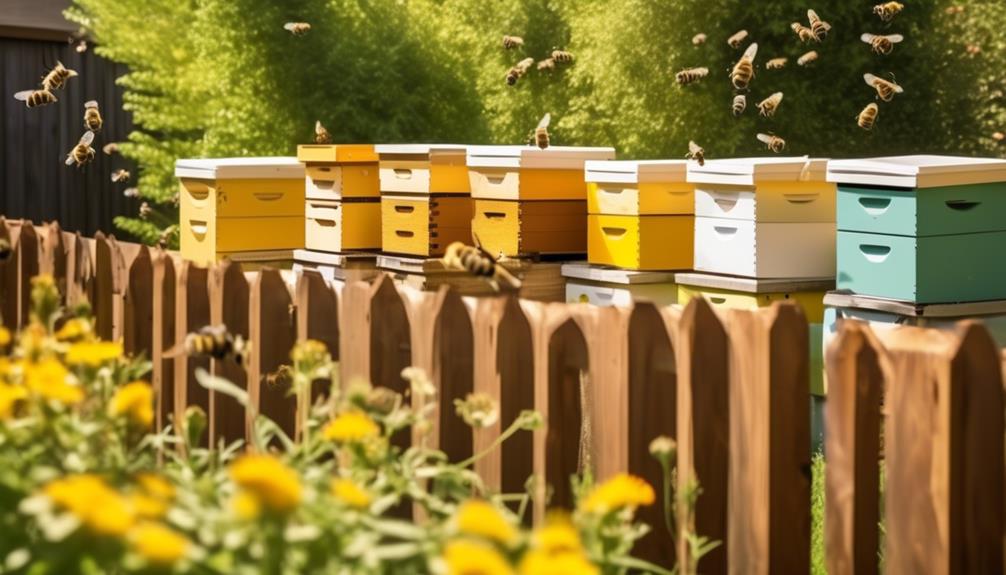
Beekeeper's journey doesn't stop at understanding the biology of bees and local regulations; you'll also face several challenges that can test your patience and dedication.
One of the primary issues is disease management. Bees can contract a variety of illnesses, such as American Foulbrood and Varroa mites, which can decimate your entire colony if not treated promptly and effectively.
You'll also need to monitor your bees for signs of stress or agitation. Bees can become aggressive for numerous reasons, including colony overcrowding, insufficient food sources, or the presence of a weak queen. Managing an angry swarm isn't just challenging—it's potentially dangerous.
Moreover, maintaining a balance between your bees and the local ecosystem is crucial. Overpopulation can strain local flora, leading to malnutrition for your bees. Conversely, if your colony is too small, it might fail to thrive due to inadequate worker bees.
Lastly, the weather can pose a significant challenge. Cold winters can kill off a significant portion of your colony, while hot, dry summers can limit food availability. You'll need to monitor and adjust your beekeeping strategies to accommodate these changing conditions.
Benefits of Suburban Beekeeping
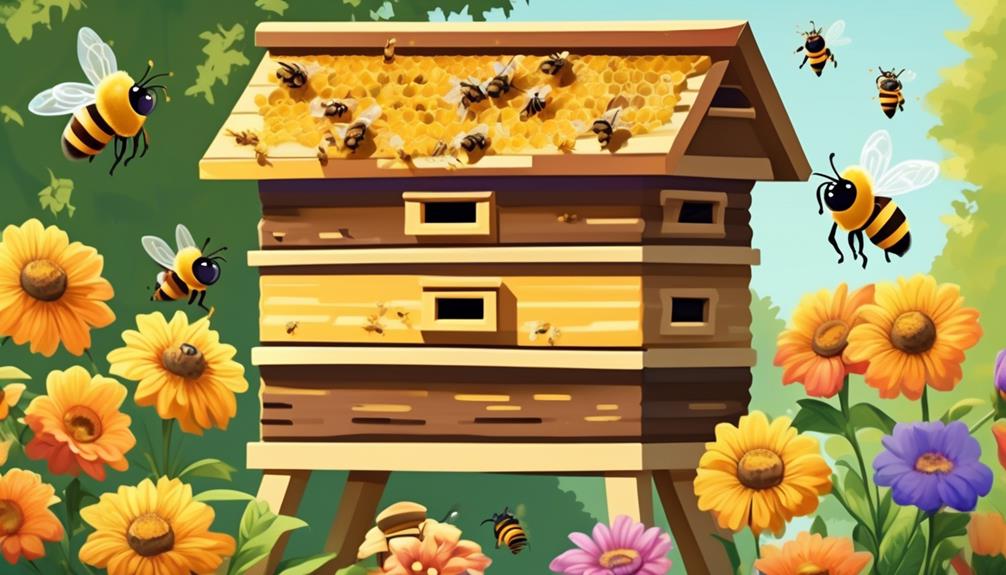
Despite the challenges, suburban beekeeping offers a plethora of benefits, from enhancing local biodiversity to providing a unique hobby that can deepen your connection with nature.
By maintaining a hive, you're contributing to the environment's health. Bees play a crucial role in pollination, promoting the growth of trees, flowers, and other plants that serve as habitats for various wildlife.
Moreover, your suburban beekeeping activities could help counter the global decline in bee populations. Bees are currently threatened by numerous factors including pesticides, habitat loss, and diseases. By providing a safe haven for these insects, you're contributing to their preservation and consequently, the stability of our ecosystem.
On a more personal level, harvesting your own honey is a rewarding experience. Not only is it a sustainable source of food, but honey produced by local bees often contains pollen from local plants, potentially reducing the severity of seasonal allergies.
Additionally, beekeeping can be therapeutic. It requires patience, observation, and a degree of calmness, which can help reduce stress and anxiety. It's an engaging hobby that's not only beneficial to the environment but also to your mental wellbeing.
Steps to Start Suburban Beekeeping
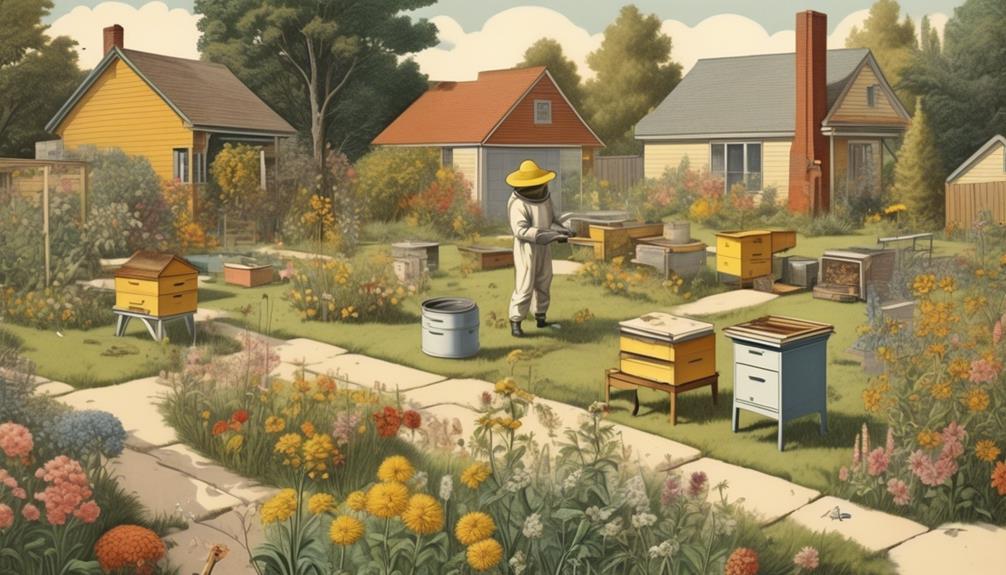
Intrigued by the myriad benefits and want to embark on your own suburban beekeeping journey? Let's explore the initial steps you need to take to establish a thriving bee colony right in your backyard.
Your first step is researching local regulations. Some subdivisions may have restrictions on beekeeping, so it's crucial to understand the rules before you begin.
Once you've got the green light, it's time to invest in equipment. You'll need a hive, a bee suit, gloves, a smoker, and beekeeping tools.
Next, you need to source your bees. You can purchase them from a reliable supplier or adopt a wild swarm.
When you're ready, introduce the bees to their new home. It's important to do this in the spring, when flowers are abundant and the climate is mild.
Lastly, you'll need to learn about bee health and hive management. Regular inspections are crucial to spot potential issues. You'll also need to learn how to harvest honey without harming your bees.
Frequently Asked Questions
What Are the Potential Risks to Neighbors or Pets in the Subdivision From Beekeeping?"
Yes, your beekeeping could pose risks to neighbors or pets. Bees may sting if they feel threatened, causing allergic reactions in some individuals. Pets too could get stung if they disturb the hive.
Additionally, a swarm might leave the hive to find a new home, which could potentially settle in a neighbor's property.
Therefore, it's important you're mindful and responsible in managing your bees to minimize these risks.
How Can Bees Impact the Local Ecosystem Within a Subdivision?"
Bees can greatly impact your local subdivision ecosystem. They're pollinators, meaning they help plants reproduce. When a bee collects nectar, pollen sticks to its body. As it moves from flower to flower, it's transferring pollen, aiding in fertilization. This process supports the growth of local flora.
Bees also contribute to food production, as many fruits, nuts, and vegetables depend on pollinators. However, if they're not managed properly, bees can become a nuisance to neighbors.
Are There Specific Types of Bees That Are Better Suited for Suburban Beekeeping?"
Absolutely, there are specific types of bees better suited for suburban beekeeping.
You'll find that European honey bees are a popular choice due to their docility and excellent honey production.
Mason bees are also ideal as they're solitary, non-aggressive, and excellent pollinators.
However, it's crucial to consider your local ecosystem, climate, and the needs of the bee species you're interested in to ensure a successful, harmonious suburban beekeeping experience.
How Much Time Daily Is Typically Required to Maintain a Suburban Bee Colony?"
Maintaining a suburban bee colony doesn't have to eat up your day. On average, you'll need to dedicate about 30 minutes per week. That's just a few minutes per day.
However, in the spring, you might spend a bit more time managing swarm control and hive inspections. It's not a full-time job, but it does require a consistent commitment.
What Is the Average Lifespan of a Bee in a Suburban Environment?"
You're curious about the average lifespan of a bee in a suburban environment.
A worker bee typically lives for 5 to 6 weeks during summer, and several months in winter.
However, it's crucial to note that a bee's lifespan can be influenced by factors such as the availability of food, presence of predators and exposure to pesticides.
Conclusion
So, can you keep bees in a subdivision? Absolutely, if your local regulations permit.
Despite challenges, such as limited space and potential conflicts with neighbors, the benefits are immense.
From enhancing local plant life to producing your own honey, suburban beekeeping can be a rewarding endeavor.
Just remember, study the necessary guidelines, prepare properly, and soon you'll be a vital part of your local ecosystem's health and sustainability.

